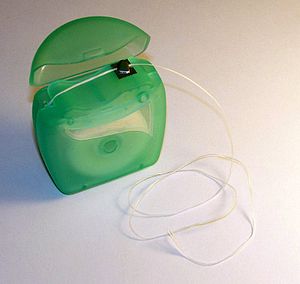 Image via Wikipedia
Image via WikipediaJust brushing is not enough to maintain oral health
EVELINE GAN, eveline@mediacorp.com.sg
SIMON Seah has rather good oral care habits. Or at least, he thinks he does.
On a typical day, the 56-year-old's oral care regimen includes brushing twice daily, and rinsing his mouth with water after meals because he can't stand the feeling of having food particles stuck in between his teeth.
Even though Mr Seah agrees his oral care could be somewhat more thorough, he thinks "it is clean enough". But dental experts would beg to differ.
OF MOUTH RINSES AND FLOSS
Early this year, the Asia-Pacific Panel of Dental Experts recommended a new oral care regimen to combat adult tooth decay and gum disease.
On top of brushing twice daily, adults should also incorporate interdental cleaning once a day and use an antibacterial mouth rinse twice daily. Interdental cleaning refers to cleaning the surfaces between the teeth using floss or other more specialised toothbrushes.
Simply relying on toothbrushing is not enough to maintain a healthy mouth, said Dr Chung Kong Mun, president of the Society of Periodontology Singapore.
Dr Chung explained: "(Just brushing) will not effectively reduce most of the dental plaque from surfaces in the oral cavity especially those around the molars." This is especially so for people with malaligned teeth as well as those who have dental appliances or restorations.
"Studies have demonstrated that antiseptic mouth rinses can actually kill the majority of bacteria present in the mouth efficaciously and safely," said Dr Chung, who added that regular dental checkups are the most important.
While such oral health advice isn't new, not many Singaporeans actually practise it.
A recent local oral care study, conducted by Johnson & Johnson, the manufacturers of Listerine, showed that less than one fifth of its participants practise this. The study involved 150 people from 15 to 65 years old across Singapore.
The findings, released last month, revealed that 93 per cent of the participants had heard of rinsing and 86 per cent had heard of flossing, but only 21 and 35 per cent actually rinsed and flossed daily.
"The study confirms most people do not take oral care seriously and are unable to maintain effective oral care with mechanical means (brushing) alone," said Dr Chung.
THE WINDOW TO YOUR OVERALL HEALTH
According to Dr Chong Kai Chuan, director of dental care group, Q&M Dental Institute, the most direct effect of a dirty mouth is an increased risk of dental decay and gum diseases.
More worryingly, bacteria in the mouth could also be linked to certain diseases.
"The mouth is the mirror to the body's health. Looking into the mouth, a clinician can diagnose systemic infections such as late-stage syphilis and herpes infections," said Dr Chong.
He added that certain viruses and bacteria, such as the herpes simplex viruses, flu and cold viruses, venereal diseases and fungal infections can be found in the mouth, and transmitted via the saliva.
Oral bacteria may even increase your risk of stroke and heart attack, he added. Dr Chong cited a recent study by researchers at the University of Buffalo in New York who found a direct link between gum disease and heart disease.
"It has been postulated that certain types of oral bacteria entered the bloodstream through weakened blood vessels in patients with gum diseases," Dr Chong explained.
The bacteria then set off inflammation that indirectly caused blood to clot.
From TODAY, Health – Tuesday, 05-May-2009
![Reblog this post [with Zemanta]](http://img.zemanta.com/reblog_e.png?x-id=614a0fcc-6692-4d90-9911-44635e761e8f)










No comments:
Post a Comment